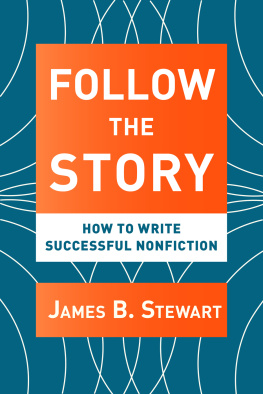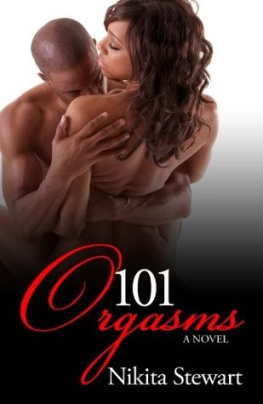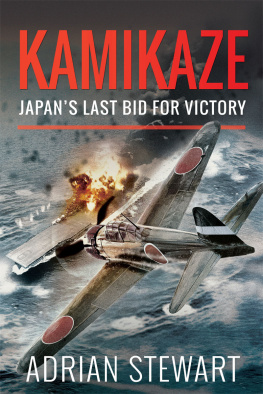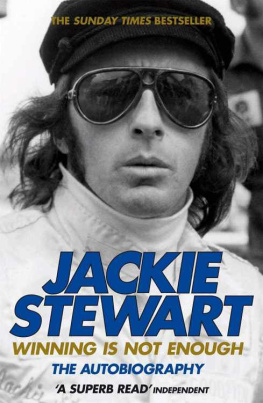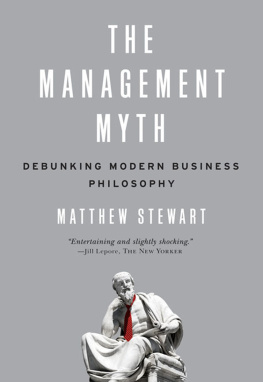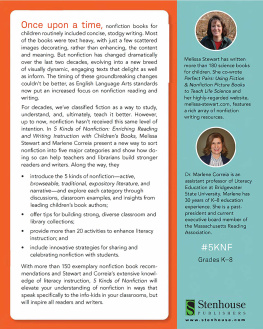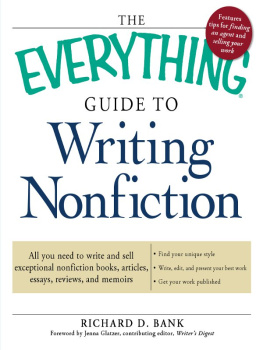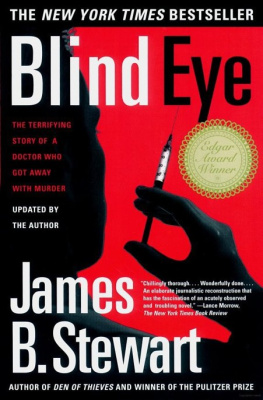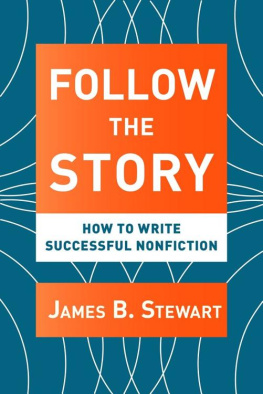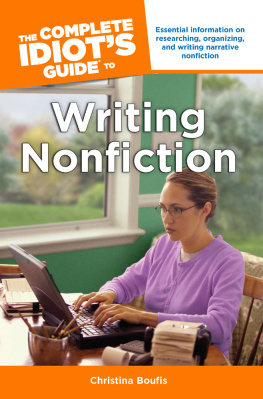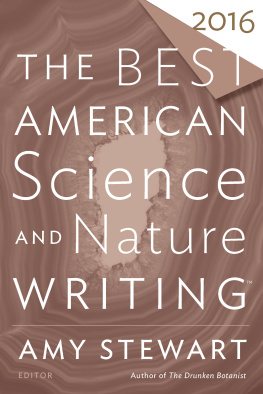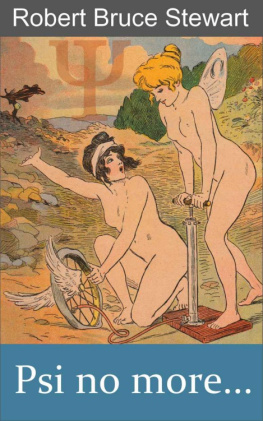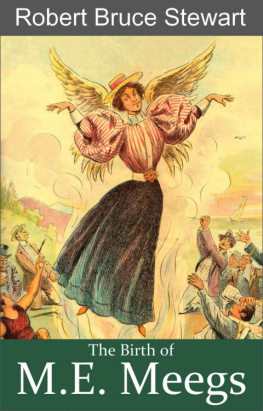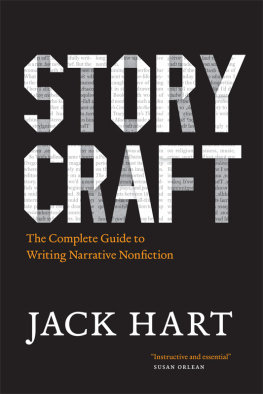ALSO BY JAMES B. STEWART
Heart of a Soldier
Blind Eye
Blood Sport
Den of Thieves
The Prosecutors
The Partners
Thank you for purchasing this Simon & Schuster eBook.
Join our mailing list and get updates on new releases, deals, bonus content and other great books from Simon & Schuster.
C LICK H ERE T O S IGN U P
or visit us online to sign up at
eBookNews.SimonandSchuster.com
To my students
CONTENTS
INTRODUCTION
I CAME TO WRITING rather late in life. As a child, I loved nothing more than to read. In this I was encouraged by my parents, at least up to a point. My sister and I were taken to the musty, turreted old public library. We rode our bikes or walked to the traveling bookmobile, returning with arms, or bike baskets, full of books. I devoured the small libraries lodged in our elementary school rooms, reading some books The Pink Motel, Thunderbolt House, and Stories of the Great Operas stick in my mindthree or four times. To circumvent the lights-out bedtime policy enforced by my parents, I kept a magnetized flashlight affixed to my bed frame so I could continue reading. But in a book titled, as far as I can recall, Blitz the Wonder Horse, Blitzs mother was killed, and I burst into tears long after the lights should have been extinguished. My mother rushed to see what was wrong, catching me sobbing over open book and flashlight.
I am often asked, usually by hopeful parents, whether I liked to write as a child. The answer is no. I wrote and delivered a short-lived neighborhood newspaper, but I was more interested in the miniature printing press than in the written content. Nobody ever suggested to me that writing might be enjoyable. I associated writing with the endless sentence diagrams used to drill into our minds the rules of English grammar, and with tortured efforts to write iambic pentameter or haiku. Nobody in my age group was encouraged to express themselves as youngsters, let alone view writing as some kind of self-therapy. I became interested in journalism in college, where I worked on and eventually edited my college newspaper. But there we thought of ourselves as first and foremost investigative reporters, not writers. Writers were part of a bohemian crowd that hung out in the offices of the literary magazine.
Even now, Im not convinced that many professional writers like to write in the sense that they find writing to be funsomething that, in and of itself, yields pleasure. It may be absorbing, satisfying, even exhilarating, but it is hard work. Joan Didion wrote a memorable essay in The White Album describing the pain and descent into near madness that seemed inevitably to accompany her own writing. I have known many colleagues, some of them terrific writers, who seemed all but paralyzed by anxiety before beginning a story. The proverbial writers block afflicted many of my former colleagues at The Wall Street Journal at one time or another. I myself tend to think of writing as much like taking an examthe experience is deeply absorbing, my concentration is intensely focused, time seems suspended yet suddenly hours have elapsed. At the end of a day of writing, I feel drained. The point is that I dont believe anyone has to innately love the process of writing to be a good writer, and to find it an immensely satisfying pursuit.
For there is enormous pleasure to be derived from writing. In my own work, I find a moment comes when I realize that I have gathered a critical mass of informationenough to ensure that I have the raw material for a good story. At that juncture a great deal of anxiety lifts, and I begin to savor the prospect of organizing the material into written form. For I believe the greatest cause of writers block, not to mention stage fright, is the fear that one has nothing to saynot that one doesnt know how to say it. Inspiration often comes at odd timeswhile Im showering, or jogging, or riding the subway. It is a pleasant and stimulating experience. And once a first draft is on paper, or in the computer, and the physical task of processing so many words is done, I find there is enormous pleasure in experimenting, in moving things around, in rewriting for particular effect, in fine-tuning ones work. As this book should make clear, much of a writers work takes place entirely within the mind, not while he or she is sitting at a keyboard. In that sense, writing is an activity that informs nearly every aspect of life. It is a way of thinking, a way of looking at the world, and a way of processing information that not only contributes to stories, articles, and books but also enhances ones appreciation of life.
Very few people are, in my experience, natural writers. Taking the young Mozart as my model, in my youth I assumed genius was something bestowed by God, and so I dabbled in everything from art to music to athletics, hoping that sooner or later genius would manifest itself. Naturally, I was disappointed. Some people may be more gifted than others, but excellence in writing, as in any art form or craft, involves discipline and practice. I have known writers who, early in their careers, demonstrated almost no natural talent. Yet with enough enthusiasm and determination, and years of effort, they have developed into good, even successful, writers. They have usually done so, I should add, with remarkably little guidance.
As for me, I have had the benefit of some fantastic editors: Alice Mayhew at Simon & Schuster, Norman Pearlstine at The Wall Street Journal, Tina Brown and John Bennett at The New Yorker, Jane Amsterdam at American Lawyer and later at The New Yorker, Steven Brill at American Lawyer , Jane Berentson at American Lawyer and The Wall Street Journal, and Steve Swartz at The Wall Street Journal and SmartMoney magazine. Most of what I have learned about writing I have absorbed from them and synthesized into the approach that I use in my own work. As I will make clear at greater length, every writer, no matter how accomplished, needs and can benefit from a good editor. I was lucky to have good editors, and I sought them out. For I wanted to learn how to write better, yet had found that traditional approaches to teaching writing hadnt worked for me.
This book had its genesis during my tenure as Page One editor of The Wall Street Journal . The Journal s front page is an institution in American journalism, and it was the main reason I applied for a job as a reporter at the paper in 1982. When I had started working at American Lawyer several years earlier, then-editor Steven Brill pointed to the Journal s front-page stories as models, and he paid for subscriptions to the Journal so we had copies on our desks every morning. Under the Journal s legendary editor Barney Kilgore, three columns of the papers front page were devoted to lengthy feature stories, which explored subjects in depth, with style, and often, especially in the middle-column stories, with wit. The front page allowed Journal reporters to expand the range of both their reporting and their writing to an astounding degree; that, in turn, enhanced the quality of their news stories. And Journal readers encountered subjects that went far beyond what might otherwise be expected from a business newspaper.
When I applied for a job at the Journal, I mailed in my rsum and several feature articles Id written for American Lawyer . I knew no one at the Journal ; I had no contacts; no one had recommended me. In due course I received a call from the editor in charge of hiring, inviting me for an interview. The interview went well, but I heard nothing until I was finally hired, nine months later, by the new managing editor, Norm Pearlstine. From the beginning, I loved writing front-page stories. I could hardly believe my good fortune when Pearlstine moved me directly from staff reporter to Page One editor in 1988.
Next page
